Adams J.T. Empire on the Seven Seas. The British Empire 1784-1939
Подождите немного. Документ загружается.

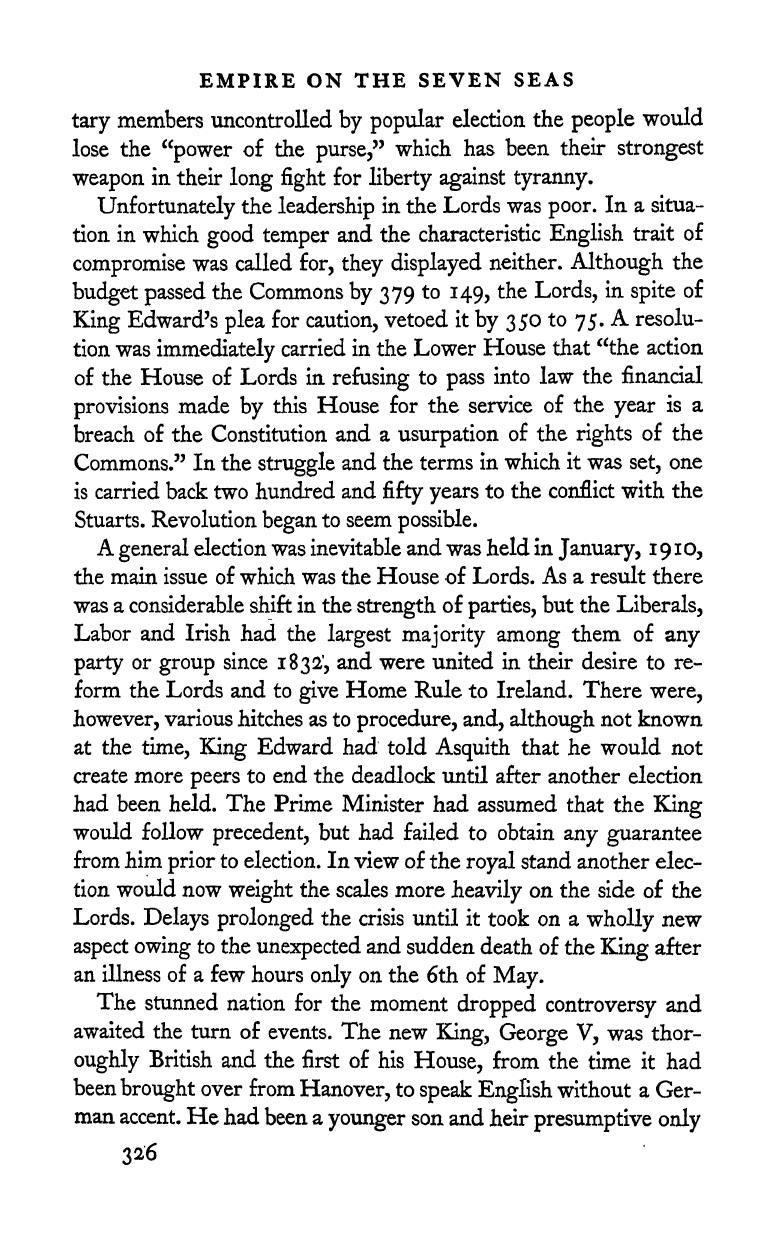
EMPIRE
ON THE
SEVEN
SEAS
tary
members uncontrolled
by popular
election
the
people
would
lose
the
"power
of
the
purse,"
which has
been
their
strongest
weapon
in
their
long fight
for
liberty against
tyranny.
Unfortunately
the
leadership
in
the
Lords was
poor.
In
a
situa-
tion
in
which
good
temper
and
the
characteristic
English
trait of
compromise
was
called
for,
they
displayed
neither.
Although
the
budget passed
the
Commons
by
379
to
149,
the
Lords,
in
spite
of
King
Edward's
plea
for
caution,
vetoed it
by
350
to
75.
A resolu-
tion
was
immediately
carried
in the
Lower
House that
"the action
of the House
of
Lords
in
refusing
to
pass
into
law
the
financial
provisions
made
by
this
House
for the service
of
the
year
is a
breach
of
the
Constitution
and
a
usurpation
of
the
rights
of
the
Commons." In
the
struggle
and
the terms
in which
it
was
set,
one
is carried back two hundred
and
fifty
years
to the
conflict with the
Stuarts. Revolution
began
to
seem
possible.
A
general
election
was
inevitable
and
was
held
in
January,
1910,
the main
issue
of
which
was the
House of
Lords.
As
a
result there
was
a
considerable shift
in
the
strength
of
parties,
but
the
Liberals,
Labor
and Irish
had
the
largest
majority among
them
of
any
party
or
group
since
1832',
and
were united in
their desire
to
re-
form the
Lords
and to
give
Home
Rule
to Ireland.
There
were,
however,
various
hitches as
to
procedure,
and,
although
not known
at the
time,
King
Edward
had
told
Asquith
that he
would not
create more
peers
to
end
the deadlock
until after
another
election
had
been
held. The Prime
Minister
had assumed
that
the
King
would
follow
precedent,
but
had
failed
to
obtain
any
guarantee
from him
prior
to
election.
In
view of the
royal
stand
another elec-
tion would now
weight
the
scales
more
heavily
on the
side
of
the
Lords.
Delays
prolonged
the
crisis until it
took
on
a
wholly
new
aspect
owing
to
the
unexpected
and
sudden death
of
the
King
after
an
illness
of
a
few
hours
only
on the
6th of
May.
The stunned
nation
for the
moment
dropped controversy
and
awaited the turn
of events.
The new
King,
George
V,
was thor-
oughly
British
and the
first of his
House,
from the
time it
had
been
brought
over from
Hanover,
to
speak
English
without
a
Ger-
man
accent.
He
had
been
a
younger
son
and
heir
presumptive
only
326
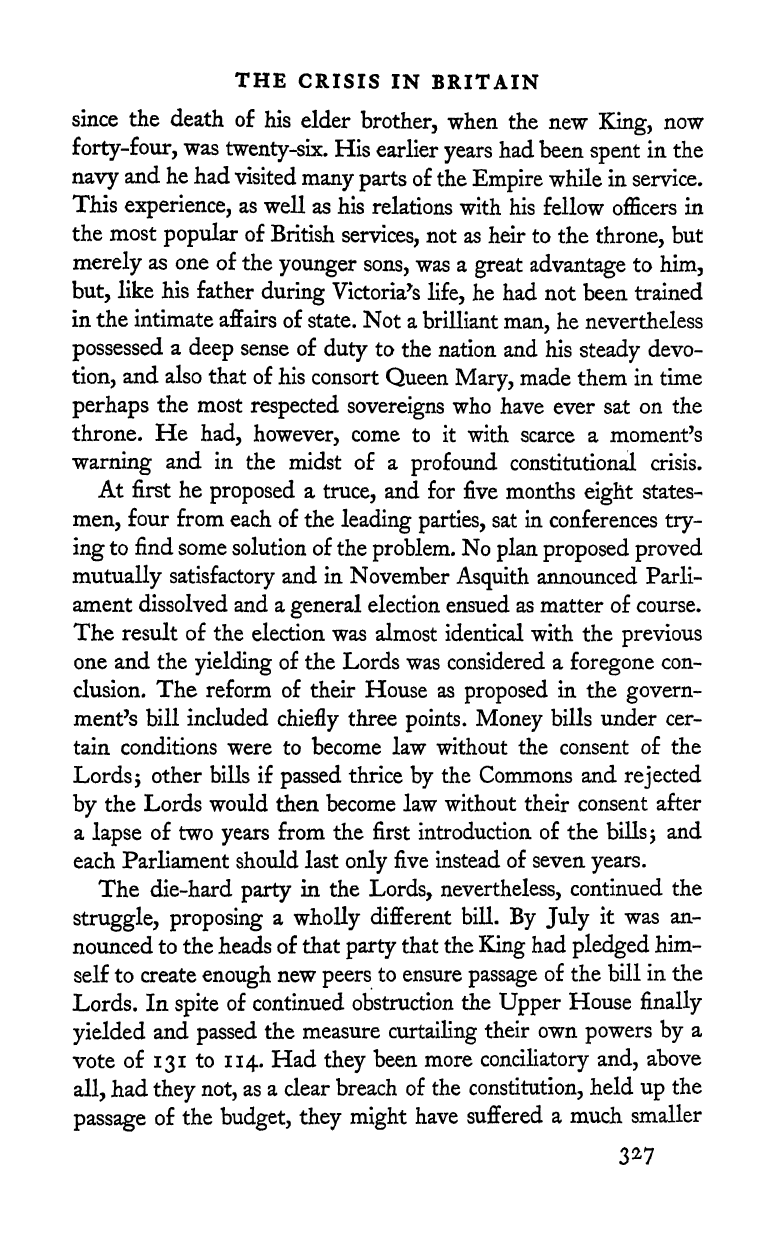
THE
CRISIS
IN
BRITAIN
since
the death
of
his
elder
brother,
when the
new
King,
now
forty-four,
was
twenty-six.
His
earlier
years
had been
spent
in
the
navy
and he
had
visited
many
parts
of
the
Empire
while in
service.
This
experience,
as
well
as his
relations
with
his
fellow officers
in
the
most
popular
of
British
services,
not as heir
to
the
throne,
but
merely
as
one
of
the
younger
sons,
was
a
great
advantage
to
him,
but,
like his
father
during
Victoria's
life,
he
had
not been
trained
in
the
intimate
affairs
of
state.
Not
a
brilliant
man,
he
nevertheless
possessed
a
deep
sense of
duty
to
the nation and his
steady
devo-
tion,
and also
that
of
his
consort
Queen
Mary,
made
them
in
time
perhaps
the
most
respected
sovereigns
who
have ever sat
on
the
throne.
He
had, however,
come
to
it
with
scarce
a
moment's
warning
and
in
the
midst of a
profound
constitutional
crisis.
At first he
proposed
a
truce,
and for
five months
eight
states-
men,
four from
each of
the
leading parties,
sat
in
conferences
try-
ing
to
find
some
solution of
the
problem.
No
plan proposed
proved
mutually
satisfactory
and
in
November
Asquith
announced
Parli-
ament
dissolved and a
general
election
ensued
as
matter of
course.
The
result of
the
election
was
almost identical
with the
previous
one
and
the
yielding
of
the
Lords was
considered
a
foregone
con-
clusion.
The reform of
their
House
as
proposed
in
the
govern-
ment's bill
included
chiefly
three
points.
Money
bills under
cer-
tain
conditions
were
to
become
law without
the consent
of the
Lords
5
other bills if
passed
thrice
by
the
Commons and
rejected
by
the
Lords
would
then
become law
without
their
consent
after
a
lapse
of two
years
from
the
first
introduction
of
the
bills}
and
each Parliament should
last
only
five
instead
of
seven
years.
The die-hard
party
in the
Lords,
nevertheless,
continued
the
struggle,
proposing
a
wholly
different
bill.
By
July
it was
an-
nounced
to
the heads
of
that
party
that
the
King
had
pledged
him-
self to
create
enough
new
peers
to
ensure
passage
of
the bill
in the
Lords,
In
spite
of continued
obstruction
the
Upper
House
finally
yielded
and
passed
the
measure
curtailing
their
own
powers
by
a
vote
of
131
to
114.
Had
they
been
more
conciliatory
and,
above
all,
had
they
not,
as
a clear
breach
of
the
constitution,
held
up
the
passage
of
the
budget, they
might
have suffered
a
much
smaller
3*7
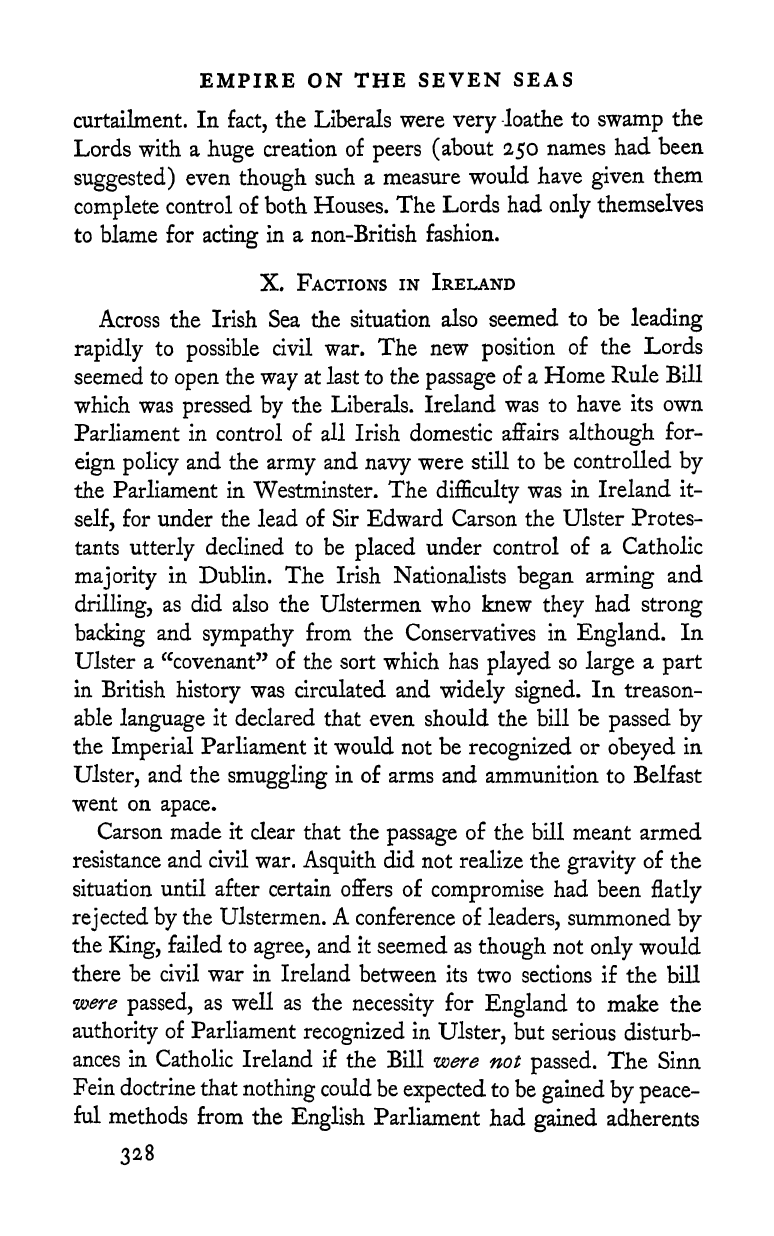
EMPIRE ON
THE
SEVEN
SEAS
curtailment.
In
fact,
the
Liberals
were
very
-loathe
to
swamp
the
Lords with
a
huge
creation
of
peers
(about
250
names had
been
suggested)
even
though
such
a measure
would
have
given
them
complete
control
of both Houses.
The
Lords had
only
themselves
to blame for
acting
in a non-British
fashion.
X.
FACTIONS
IN
IRELAND
Across
the Irish
Sea
the
situation
also seemed
to be
leading
rapidly
to
possible
civil
war.
The
new
position
of the
Lords
seemed to
open
the
way
at
last to
the
passage
of a
Home
Rule
Bill
which
was
pressed
by
the Liberals.
Ireland
was
to
have
its
own
Parliament in control of all Irish domestic
affairs
although
for-
eign policy
and
the
army
and
navy
were
still
to
be
controlled
by
the Parliament
in
Westminster.
The
difficulty
was
in Ireland
it-
self,
for
under
the
lead of
Sir Edward Carson
the
Ulster Protes-
tants
utterly
declined
to
be
placed
under control
of
a
Catholic
majority
in
Dublin.
The
Irish Nationalists
began
arming
and
drilling,
as did also
the
Ulstermen
who
knew
they
had
strong
backing
and
sympathy
from
the
Conservatives in
England.
In
Ulster
a
"covenant"
of
the
sort
which
has
played
so
large
a
part
in
British
history
was circulated
and
widely
signed.
In
treason-
able
language
it
declared
that
even should the bill
be
passed
by
the
Imperial
Parliament it
would
not
be
recognized
or
obeyed
in
Ulster,
and
the
smuggling
in
of arms
and
ammunition to
Belfast
went
on
apace.
Carson made it
clear
that
the
passage
of
the bill
meant armed
resistance
and
civil
war.
Asquith
did
not
realize
the
gravity
of
the
situation
until after
certain
offers
of
compromise
had
been
flatly
rejected
by
the Ulstermen. A
conference
of
leaders,
summoned
by
the
King,
failed
to
agree,
and it
seemed as
though
not
only
would
there be
civil war in
Ireland
between its
two
sections if
the
bill
were
passed,
as
well
as
the
necessity
for
England
to
make
the
authority
of
Parliament
recognized
in
Ulster,
but
serious
disturb-
ances in Catholic Ireland
if
the Bill
were
not
passed.
The
Sinn
Fein
doctrine
that
nothing
could be
expected
to
be
gained
by
peace-
ful
methods from
the
English
Parliament
had
gained
adherents
328
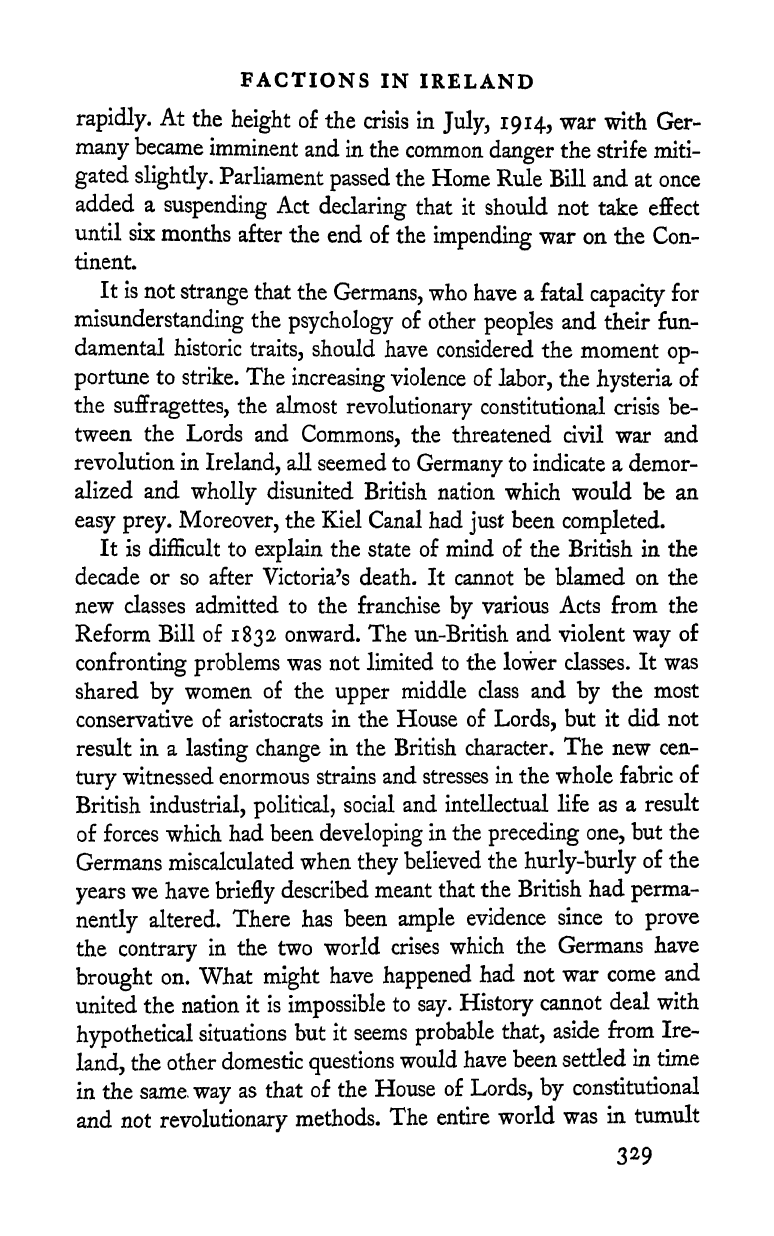
FACTIONS
IN
IRELAND
rapidly.
At
the
height
of
the
crisis in
July,
1914,
war
with Ger-
many
became
imminent and
in
the
common
danger
the
strife miti-
gated
slightly.
Parliament
passed
the Home
Rule
Bill
and
at
once
added a
suspending
Act
declaring
that it
should
not
take effect
until
six
months
after
the
end
of
the
impending
war on the
Con-
tinent.
It is
not
strange
that
the
Germans,
who
have a
fatal
capacity
for
misunderstanding
the
psychology
of
other
peoples
and their fun-
damental
historic
traits,
should
have
considered
the
moment
op-
portune
to
strike.
The
increasing
violence
of
labor,
the
hysteria
of
the
suffragettes,
the
almost
revolutionary
constitutional crisis
be-
tween
the
Lords
and
Commons,
the
threatened civil war
and
revolution in
Ireland,
all
seemed
to
Germany
to
indicate a
demor-
alized and
wholly
disunited
British nation
which
would
be
an
easy
prey.
Moreover,
the
Kiel
Canal had
just
been
completed.
It
is
difficult
to
explain
the
state of
mind
of
the British
in the
decade or
so
after
Victoria's death.
It
cannot be blamed
on the
new classes
admitted to
the franchise
by
various Acts
from the
Reform
Bill
of
1832
onward.
The un-British
and violent
way
of
confronting
problems
was not limited
to
the lower
classes.
It was
shared
by
women
of
the
upper
middle
class and
by
the
most
conservative of aristocrats
in
the
House
of
Lords,
but it
did
not
result
in
a
lasting change
in the
British character.
The
new
cen-
tury
witnessed
enormous strains
and
stresses
in
the whole
fabric
of
British
industrial,
political,
social
and intellectual
life as
a
result
of
forces which
had
been
developing
in
the
preceding
one,
but
the
Germans
miscalculated
when
they
believed the
hurly-burly
of
the
years
we
have
briefly
described
meant
that
the British
had
perma-
nently
altered.
There has
been
ample
evidence
since
to
prove
the
contrary
in
the two
world
crises
which
the
Germans have
brought
on. What
might
have
happened
had
not
war
come
and
united the
nation
it
is
impossible
to
say.
History
cannot
deal
with
hypothetical
situations
but
it
seems
probable
that,
aside
from
Ire-
land,
the
other
domestic
questions
would
have
been
settled
in
time
in
the same,
way
as
that
of
the
House
of
Lords,
by
constitutional
and
not
revolutionary
methods.
The
entire
world
was
in
tumult
3*9
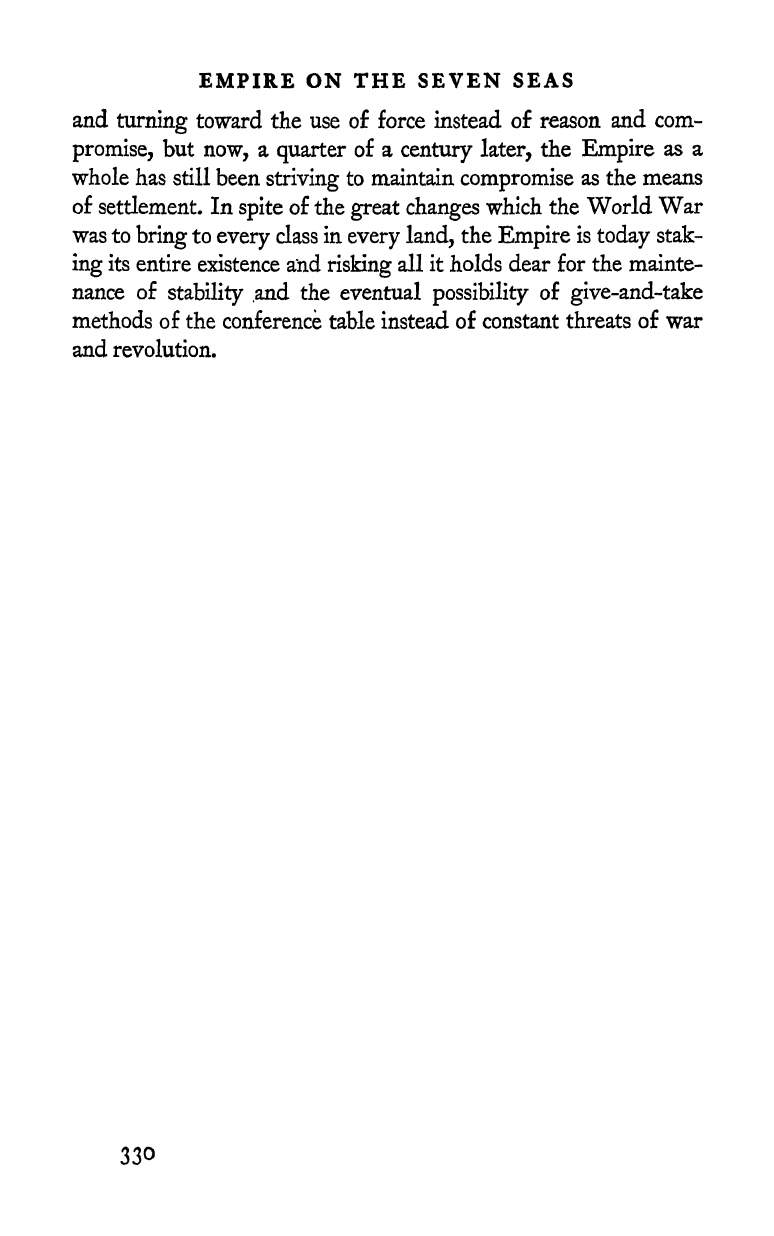
EMPIRE
ON
THE
SEVEN
SEAS
and
turning
toward the
use of force instead
of reason
and
com-
promise,
but
now,
a
quarter
of
a
century
later,
the
Empire
as
a
whole has still
been
striving
to
maintain
compromise
as the
means
of
settlement.
In
spite
of
the
great
changes
which the
World
War
was to
bring
to
every
class
in
every
land,
the
Empire
is
today
stak-
ing
its
entire
existence
aftd
risking
all it holds
dear for
the
mainte-
nance
of
stability
.and
the
eventual
possibility
of
give-and-take
methods of
the
conference
table instead
of
constant
threats of
war
and
revolution.
330
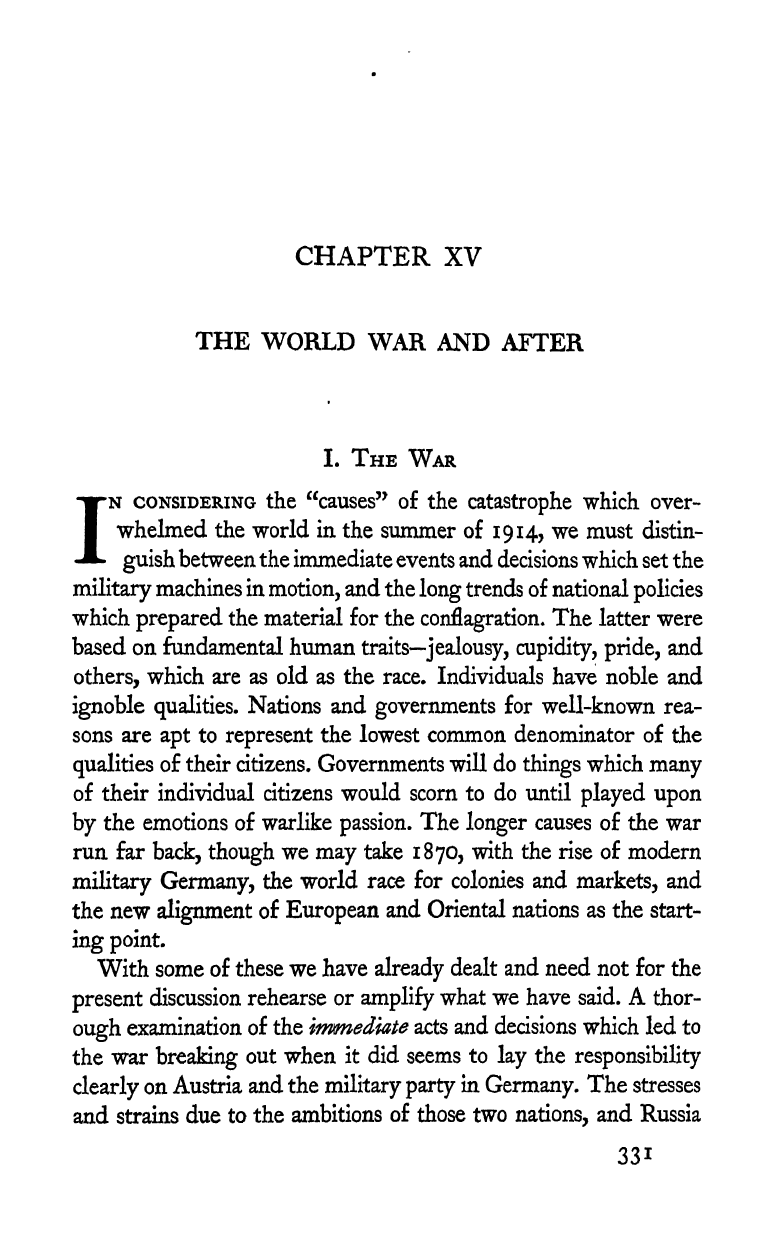
CHAPTER
XV
THE
WORLD
WAR
AND
AFTER
I.
THE
WAR
IN
CONSIDERING
the "causes"
of
the
catastrophe
which
over-
whelmed the world in
the summer
of
1914,
we must distin-
guish
between
the
immediate events and decisions
which
set the
military
machines
in
motion,
and
the
long
trends of
national
policies
which
prepared
the material
for
the
conflagration.
The
latter
were
based
on fundamental human traits
jealousy,
cupidity,
pride,
and
others,
which
are
as old as
the
race. Individuals
have noble and
ignoble
qualities.
Nations and
governments
for well-known
rea-
sons are
apt
to
represent
the
lowest
common denominator
of
the
qualities
of their citizens.
Governments will
do
things
which
many
of their individual
citizens
would scorn
to
do until
played upon
by
the
emotions
of
warlike
passion.
The
longer
causes
of
the
war
run
far
back,
though
we
may
take
1870,
with
the rise
of
modern
military
Germany,
the
world
race
for
colonies
and
markets,
and
the
new
alignment
of
European
and
Oriental
nations
as
the start-
ing
point.
With some
of these we have
already
dealt and
need
not for the
present
discussion
rehearse
or
amplify
what
we have
said. A
thor-
ough
examination
of
the
immediate
acts and decisions
which led to
the
war
breaking
out when
it
did seems
to
lay
the
responsibility
clearly
on
Austria
and the
military
party
in
Germany.
The stresses
and strains
due to
the
ambitions
of
those two
nations,
and Russia
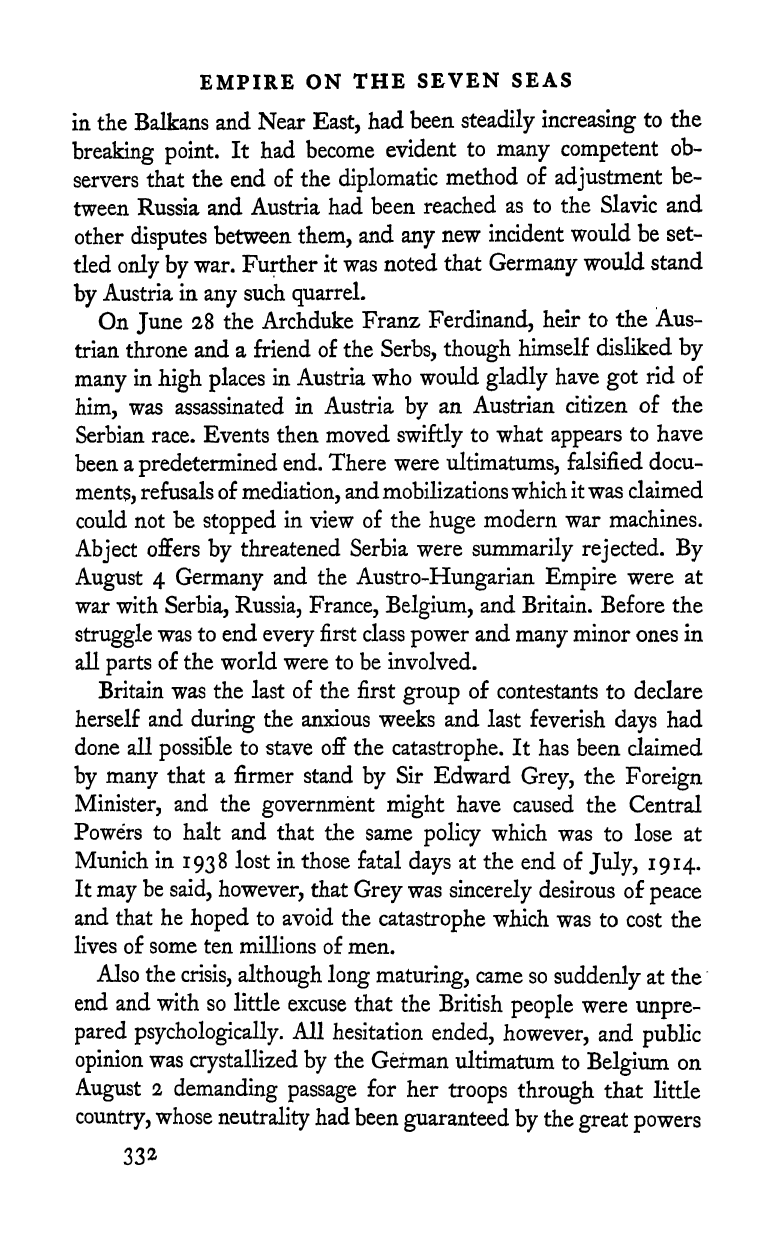
EMPIRE
ON
THE
SEVEN
SEAS
in
the
Balkans
and
Near
East,
had
been
steadily
increasing
to
the
breaking
point.
It
had
become
evident
to
many
competent
ob-
servers
that
the end
of
the
diplomatic
method
of
adjustment
be-
tween
Russia
and
Austria
had
been
reached
as to
the
Slavic
and
other
disputes
between
them,
and
any
new
incident
would
be
set-
tled
only
by
war.
Further
it
was
noted
that
Germany
would
stand
by
Austria
in
any
such
quarrel.
On
June
28
the
Archduke
Franz
Ferdinand,
heir to
the
Aus-
trian throne
and a friend
of the
Serbs,
though
himself
disliked
by
many
in
high
places
in
Austria who
would
gladly
have
got
rid
of
him,
was assassinated
in Austria
by
an
Austrian
citizen
of the
Serbian
race.
Events then
moved
swiftly
to
what
appears
to
have
been
a
predetermined
end.
There were
ultimatums,
falsified
docu-
ment?,
refusals
of
mediation,
and
mobilizations
which
it
was
claimed
could
not
be
stopped
in
view of
the
huge
modern war
machines.
Abject
offers
by
threatened
Serbia
were
summarily
rejected.
By
August
4
Germany
and
the
Austro-Hungarian
Empire
were
at
war with
Serbia, Russia, France,
Belgium,
and Britain.
Before
the
struggle
was
to end
every
first
class
power
and
many
minor
ones
in
all
parts
of the world
were
to
be
involved.
Britain
was
the
last
of the
first
group
of
contestants to
declare
herself
and
during
the
anxious
weeks
and
last
feverish
days
had
done
all
possible
to stave off
the
catastrophe.
It
has been
claimed
by
many
that a
firmer
stand
by
Sir
Edward
Grey,
the
Foreign
Minister,
and the
government
might
have
caused
the
Central
Powers
to halt
and
that the
same
policy
which
was
to lose at
Munich in
1938
lost
in
those fatal
days
at
the
end of
July,
1914.
It
may
be
said,
however,
that
Grey
was
sincerely
desirous of
peace
and
that
he
hoped
to
avoid
the
catastrophe
which
was
to
cost
the
lives
of
some
ten
millions
of
men.
Also
the
crisis,
although
long
maturing,
came
so
suddenly
at
the
end
and
with so
little excuse
that
the
British
people
were
unpre-
pared
psychologically.
All
hesitation
ended,
however,
and
public
opinion
was
crystallized
by
the
German
ultimatum
to
Belgium
on
August
2
demanding
passage
for her
troops
through
that
little
country,
whose
neutrality
had
been
guaranteed
by
the
great powers
332

THE
WAR
including
Britain.
In
1938
Great
Britain
was not a
guarantor
of
Czechoslovakia,
but in
1914
she
was
of
Belgium,
and when the
ultimatum
expired
on
the
night
of
August
4
Britain was
in
the
war,
as
the
German
Chancellor
said in
a
phrase
never
to
be
forgot,
"for
a
scrap
of
paper.'
7
In
a
word
the British
people
decided to
stand
by
their
treaty
and
keep
their
word,
a
decision
incompre-
hensible to
the
German
mind.
The
Dominions
came
promptly
and
generously
to the
help
of
the
homeland. The
extraordinary
outburst of
loyalty
shown
to
the
Mother
Country,
the
Empire,
and the
ideals and
way
of
life
for
which
they
all
stood
not
only
staggered
Germany,
but
even sur-
prised
the
world
at
large.
The
exhibition
of
solidarity
was
mag-
nificent
and
convincing.
The
Empire
evidently
did
not
mean
op-
pression
or
trade. It meant
passionate
devotion
to certain
beliefs
and
to
the
great
Commonwealth
of Nations
which
had
grown
up
in
British
fashion,
linked
by
the
symbol
of the
Crown
and bound
by
neither force nor
legislation.
The
Empire
was
proved
to
be
not
a
tyranny
or
a
Zollverein
or a
political
federation,
but
something
far more substantial
and
formidable
a
union
of
hearts and
loyal-
ties.
Canada,
New
Zealand,
and
Australia
sent men
as
freely
as
did
Britain
itself,
and
large
contingents
from South
Africa
and
India
also
fought
in
Europe.
At
home,
unity
replaced
strife
in
all
branches
of
the
national
life,
and
Germany
was shown
to have
made
a
complete
miscalculation in
counting
on a
divided
country
and
a
disloyal
Empire.
In
general
in
the
past
Britain
when
engaged
in
Continental
wars
had made her contribution
by
means
of her
navy,
financial
sub-
sidies to her
allies,
and
usually
only
a
small
army.
In
this
terrific
struggle
from
1914
to
1918
the
navy
played
its
accustomed
role.
Without the
complete
control
which
it exercised
over
the
seas,
neither
food,
supplies
nor
troops
could have
been
moved. In
spite
of
new
weapons
of
war,
such
as
tanks,
submarines,
poison
gas,
aero-
planes,
and
others,
control
of
the
seas
proved,
as
in the
past,
the
final
determining
factor.
British credit
also stood
the
strain
of
advancing
billions
of
dollars
to her
allies.
But unlike
previous
wars
practically
the
entire
manhood
of the
Empire,
and
we
may
say
333

EMPIRE
ON THE
SEVEN
SEAS
womanhood,
was
involved
in
the
struggle.
It was
the
first
war in
which the
whole
civil
population
was
engaged.
For
the
military
services
alone
men
offered themselves
from
every
quarter
of
the
Empire.
In
Britain
itself
no less
than
5>oor
ooo
volunteered,
though
many
had to
be
rejected
as
physically
unfit.
The
vast
numbers
of
British
troops
fought
not
only
on
the
Western Front in
France,
but all
over
the
world
in
East,
South
and West
Africa,
the
islands
of the
Pacific,
in
Egypt,
Turkey,
Palestine,
Macedonia,
Italy,
and elsewhere.
As
the
struggle
con-
tinued
one
nation
after
another came
in,
Italy, Portugal,
all
the
Balkan
countries,
Japan,
China,
the United
States
(1917),
and
others.
In some
cases
armies
larger
than
any
Britain
had
ever
had
in the field
anywhere
before were
fighting
in distant
quarters
with
the
need
of
transport
of
men
and
supplies
of
all
sorts.
It was indeed
not
one
war but
many
going
on
simultaneously.
To
describe
them
all in detail for
the four
years
is
impossible
and
unnecessary.
What we
are
more
interested in
is the
effect
of the
war
on
the
Empire
and
its
life
and
structure.
We can
merely
skim
over the
military
events.
At
the
very beginning,
the
Germans,
having
counted
on
broken
treaties and
overwhelming
force for
their
Blitzkrieg,
failed
to
get
through.
They
quickly
overran
Belgium
and
swept
down
across
France to
within
a few miles
of
Paris,
but
there
they
were
held
and
turned back. With
their
digging
in
on their
new
line
the
long
trench war
began
which
was to
last till
1918.
They
made a
strike,
however,
to
capture
the Channel
ports,
so as
to
control the
Dover
Straits,
but
were
repelled
by
the
small
British
forces
with
enor-
mous
bloodshed.
In the
East,
Russia
advanced to
take
the
pressure
off
France,
but suffered
a
terrible defeat
at
Tannenberg,
and mean-
while
Turkey
had
joined
the Central
Powers,
menacing
Egypt,
the Suez
Canal,
and
even
India.
Germany,
blockaded
by
the
British
navy,
had to
see her
colonies
lost.
The
year
1915
was
a
discouraging
one
for the
Allies,
though
it
saw
the
entry
of
Italy
on
their
side.
The
costly
but
gallant
failure
of
the attack on
the
Dardanelles,
in
which
the
Australians and
New
Zealanders
par-
ticularly
distinguished
themselves,
had
been
undertaken to relieve
334
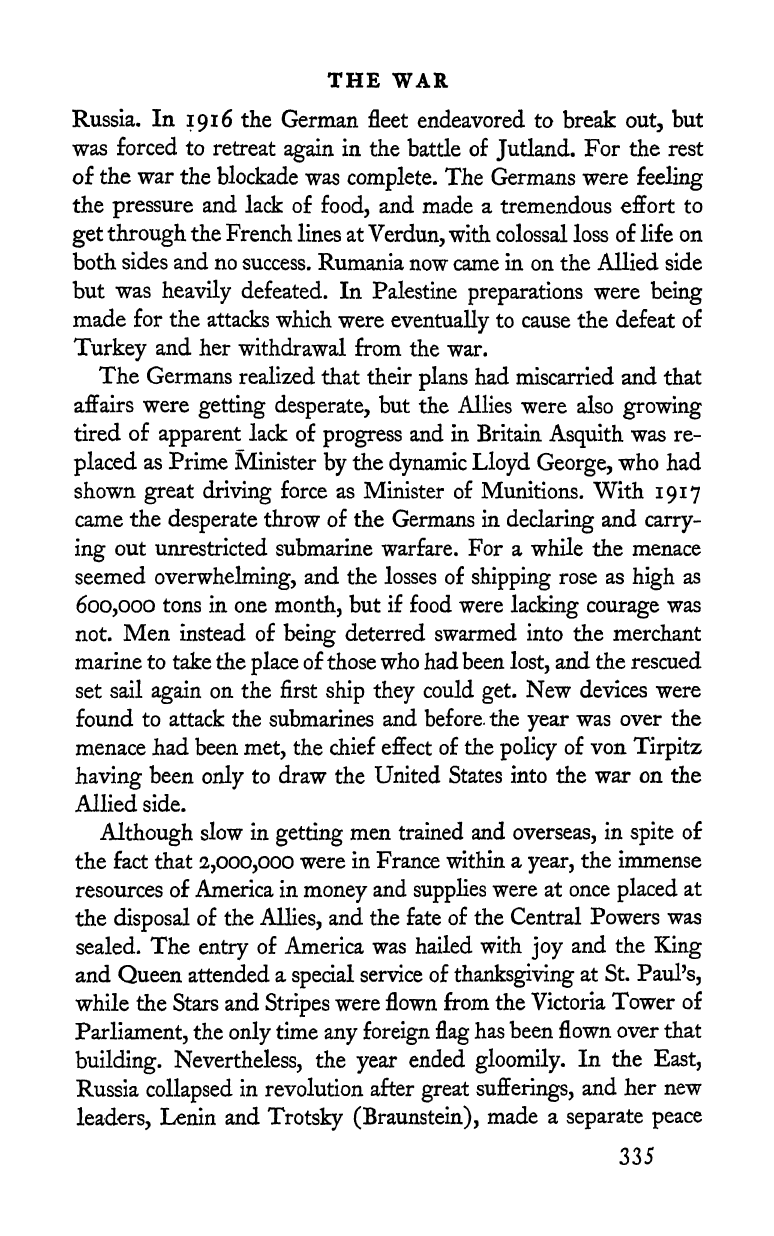
THE
WAR
Russia.
In
1916
the
German fleet
endeavored
to break
out,
but
was
forced
to
retreat
again
in the
battle
of
Jutland.
For the
rest
of
the war
the
blockade
was
complete.
The Germans
were
feeling
the
pressure
and
lack of
food,
and
made
a
tremendous
effort to
get
through
the
French
lines
at
Verdun,
with
colossal
loss of life
on
both
sides
and no
success.
Rumania
now
came
in
on
the Allied
side
but
was
heavily
defeated. In
Palestine
preparations
were
being
made for the
attacks
which
were
eventually
to
cause
the
defeat
of
Turkey
and
her
withdrawal
from
the war.
The
Germans
realized
that their
plans
had miscarried and
that
affairs
were
getting
desperate,
but
the Allies
were
also
growing
tired
of
apparent
lack
of
progress
and in
Britain
Asquith
was
re-
placed
as
Prime
Minister
by
the
dynamic Lloyd
George,
who
had
shown
great
driving
force
as
Minister
of Munitions.
With
1917
came
the
desperate
throw
of the
Germans
in
declaring
and
carry-
ing
out
unrestricted submarine warfare. For a
while the
menace
seemed
overwhelming,
and the losses
of
shipping
rose
as
high
as
600,000
tons in one
month,
but
if
food
were
lacking courage
was
not.
Men instead
of
being
deterred
swarmed
into
the merchant
marine
to take
the
place
of those
who
had been
lost,
and the rescued
set sail
again
on the
first
ship
they
could
get.
New
devices were
found
to
attack the
submarines
and before, the
year
was
over
the
menace
had
been
met,
the chief
effect
of
the
policy
of
von
Tirpitz
having
been
only
to
draw the
United
States
into
the war on the
Allied
side.
Although
slow
in
getting
men
trained
and
overseas,
in
spite
of
the
fact
that
2,000,000
were
in
France
within
a
year,
the
immense
resources
of America
in
money
and
supplies
were at
once
placed
at
the
disposal
of the
Allies,
and
the
fate
of the
Central Powers
was
sealed.
The
entry
of America was
hailed
with
joy
and the
King
and
Queen
attended
a
special
service
of
thanksgiving
at
St.
Paul's,
while the Stars
and
Stripes
were
flown
from the Victoria
Tower
of
Parliament,
the
only
time
any
foreign flag
has
been
flown
over
that
building.
Nevertheless,
the
year
ended
gloomily.
In the
East,
Russia
collapsed
in
revolution
after
great
sufferings,
and
her
new
leaders,
Lenin
and
Trotsky
(Braunstein),
made
a
separate peace
335
